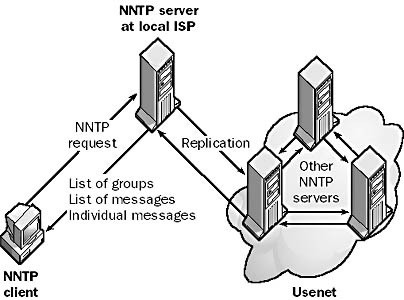Definition of USENET in Network Encyclopedia.
What is Usenet?
Usenet is a global network of servers that supports approximately 50,000 newsgroups on every imaginable topic. These servers are called news servers. Thousands of them around the world collectively function as a global bulletin board.
Usenet is part of the Internet’s family of protocols and services and is typically used by individuals for such purposes as:
- Asking questions or requesting assistance on a particular issue
- Distributing free information, including binary files such as images, sound clips, and multimedia files
- Advertising products and services
- Discussing issues of general, regional, local, or topical interest
How Usenet Works
The Usenet system is based on the Network News Transfer Protocol (NNTP), a standard Internet protocol defined in Request for Comments (RFC) 977 that has two components:
- A client/server portion that allows users running client software such as Microsoft Outlook Express to interact with news servers by downloading a list of available Usenet newsgroups on the server, reading existing messages in the newsgroups, replying to existing messages, or posting new messages.
- A server/server portion that allows news servers to communicate with each other, primarily for the purpose of replicating messages from newsgroups. An example of software that can function as a Usenet server is Microsoft Exchange Server, which fully supports NNTP.

Users typically gain access to the Usenet system by dialing into their local Internet service provider (ISP) and accessing a news server running at the ISP. Users typically must have an account and a password to connect to their ISP’s news server, although a number of free Usenet servers are also available on the Internet. Users employ NNTP client software such as Outlook Express to access newsgroups on the ISP’s server and post new messages to them. Periodically, the ISP’s news server replicates its newsgroup messages by pushing or pulling newsfeeds together with nearby Usenet servers on the Internet. As a result, within about 24 hours the messages posted by users are available on virtually every Usenet server in the world. A message typically remains on a news server for a few weeks or until enough new messages have been posted to the newsgroup to bump the old messages off the list.
As mentioned earlier, Usenet currently consists of around 50,000 newsgroups, although new groups are constantly being created as old ones die off. Most news servers do not carry the complete range of Usenet newsgroups because of the multigigabyte size of a full newsfeed. Other news servers exclude certain categories of groups, such as adult newsgroups. Some newsgroups are moderated, which means that new postings to the group must be approved by a moderator before they can appear in the newsgroup. This minimizes the “noise” or extraneous messages (mostly advertising).
The Usenet system of newsgroups is hierarchical in nature, similar to the Domain Name System (DNS). At the top level, Usenet consists of a number of top-level news hierarchies that identify either a range of topics (such as .rec for recreational topics) or a geographical location (such as .mn for Minnesota). The following table shows some of the popular top-level categories. Newsgroups are created hierarchically under these top-level categories, as in these examples:
- forsale.mn
- computers.forsale.mn
- macintosh.computers.forsale.mn
Top-Level Usenet Categories
| Category | Description |
| alt | Alternative, which is a collection of various topics |
| comp | Information on computer hardware, software, algorithms, and so on |
| misc | Miscellaneous information |
| news | Information about Usenet itself |
| rec | Recreational topics such as hobbies and travel |
| sci | Scientific issues |
| soc | Social issues |
| talk | General discussion topics such as politics and religion |
USENET using a browser
If you don’t have an NNTP client program or if your company firewall will not allow you to access Usenet services using the well-known port number for NNTP (port 119), you can still access Usenet (if you can browse the Internet using a standard Web browser such as Microsoft Internet Explorer). Web sites such as Deja.com (www.deja.com) offer a Web interface for reading and posting to Usenet newsgroups. (Before you do this, make sure that your company does not have any policies forbidding employees to access Usenet.)
External references: